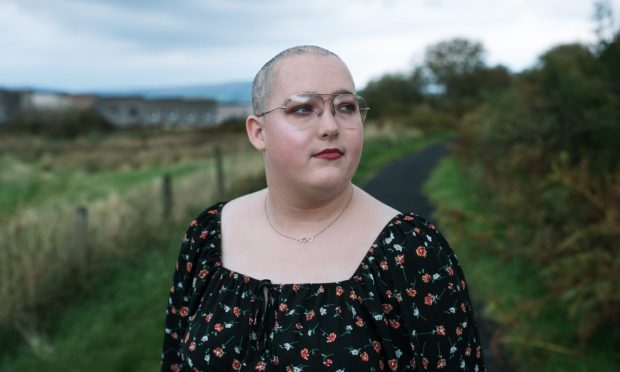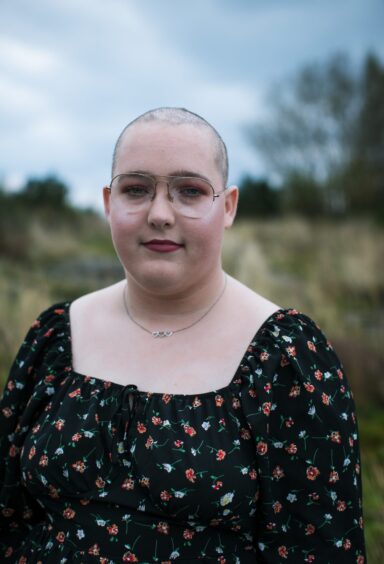
To the outside world Bethany Stewart is a young woman with a trendy buzz cut hairstyle, make-up and clothes.
Her job with an online finance company is blossoming at 23, so much so that she is now training staff and making plans for a successful career pathway ahead.
However, Bethany from Port Glasgow, reveals that today’s confidence has come after emerging from an episode of stress in her younger years.
Heartbreak over losing three of her grandparents when she was a child triggered emotional problems, making her anxious and nervous, and she began to tug and pull at her hair.
“I went on to develop a stress-related condition called trichotillomania where I would subconsciously reach for my head and pull at my hair, perhaps grasping it for some sort of emotional relief,” she says.
“It became so bad that I eventually developed bald patches and would sweep my hair into a style to try to hide or camouflage this.
“Eventually, I just shaved my head because a bald or buzzcut was easier to manage.”
Doctors believe that trichotillomania or ‘trich’, as its known, affects 2% of people, mainly teenagers under stress.
They include Oxford University professor Clare Mackay, who says she has lived with it for 40 years, since age 12.
She raised this at a conference on body-focused repetitive behaviour in Oxford last month and called for a greater understanding.
Research in the US states that the average onset age in women is 14 and 19 in males.
Stress has been thrown into sharp focus recently with the Mental Health Foundation revealing that at least 74% of people have felt so stressed they have been overwhelmed or unable to cope recently.
A third of Scottish parents say that social anxiety makes their children feel stressed.
This is not helped by many parents being under pressure themselves because of work or money. Understandably, they struggle to give children the time they need.
Bethany says: “For me losing three grandparents in a short space of time made me fearful and no matter how kind and loving my family was, I couldn’t process the bereavement,” Bethany adds. She says she has learned to cope.
“We all have to make the best of who we are and cope with habits or compulsions if they affect our lives. But there are currently huge waiting lists for medical help for young people suffering from stress.
“It is so important to improve this if young people are to grow into happier adults.”
Research shows lack of mental health services available to children
What are the waiting lists?
The Scottish Government says that 84.1% of children and young people referred to Child and Adolescent Mental Health Service (CAMHS) appointments started treatment within 18 weeks of referral, a reduction from 86% earlier this year. NHS Scotland’s target is 90% of young people being seen within 18 weeks.
Stark and painful inequalities are the reality for young people needing mental health care in rural Scotland.
Change Mental Health charity reports that children in rural areas can wait significantly longer for treatment.
The charity calls for equality in access to compassionate mental health treatment for children and young people across Scotland.
In women over their 20s hair loss can be triggered by health conditions such as an abnormal thyroid, anaemia or vitamin deficiency. Hormonal changes in pregnancy and the menopause can cause hair to thin.
Some medications and supplements for high-blood pressure and gout or high vitamin A can trigger hair loss.
Clive Byles, a stylist with Lucinda Ellery hair replacement in Edinburgh, says: “There are ways to keep the appearance of hair through weaves, extension-like enhancers and more comprehensive replacements. These can restore confidence and we are currently with clients.”
The Scottish Government said: “We absolutely understand the distress caused to children, young people and their families by any delay in accessing mental health support. Whilst we recognise the ongoing pressures facing the NHS, long waits are unacceptable.
“We have allocated £120 million to NHS Boards to improve the quality and delivery of mental health services for all, including CAMHS. In addition, we have provided local authorities with £15 million per annum to fund community-based mental health supports for children, young people and their families.”

Enjoy the convenience of having The Sunday Post delivered as a digital ePaper straight to your smartphone, tablet or computer.
Subscribe for only £5.49 a month and enjoy all the benefits of the printed paper as a digital replica.
Subscribe © Andrew Cawley
© Andrew Cawley